Ward A.W. The Cambridge History of British Foreign Policy. 1783-1919. Volume 3
Подождите немного. Документ загружается.

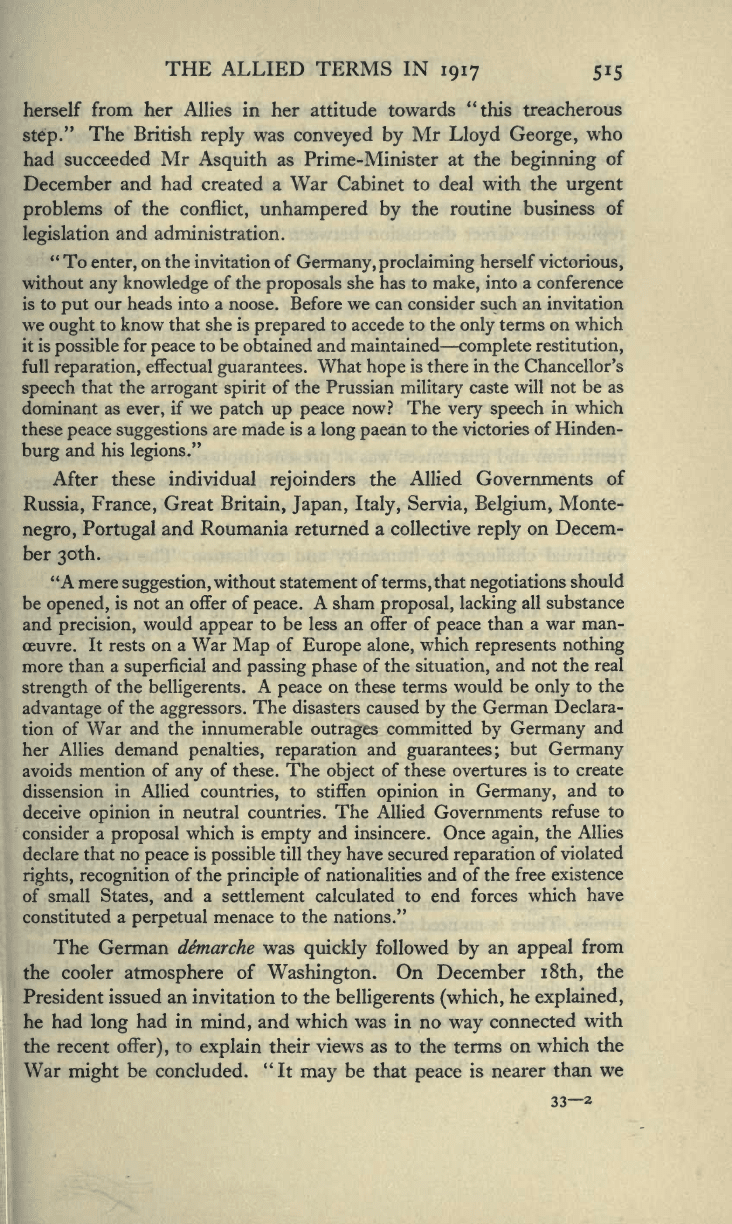
THE ALLIED TERMS
IN
1917
515
herself
from
her Allies
in her attitude towards "this
treacherous
step."
The British
reply
was
conveyed
by
Mr
Lloyd
George,
who
had
succeeded
Mr
Asquith
as Prime-Minister at the
beginning
of
December
and had
created
a War
Cabinet
to
deal with the
urgent
problems
of
the
conflict,
unhampered
by
the
routine
business
of
legislation
and
administration.
"
To
enter,
on
the
invitation of
Germany, proclaiming
herself
victorious,
without
any
knowledge
of the
proposals
she has to
make,
into
a conference
is to
put
our
heads
into a
noose.
Before
we
can
consider
such an invitation
we
ought
to know that
she is
prepared
to accede to the
only
terms
on
which
it is
possible
for
peace
to be obtained and maintained
—
complete
restitution,
full
reparation,
effectual
guarantees.
What
hope
is
there
in
the Chancellor's
speech
that the
arrogant
spirit
of the Prussian
military
caste will
not
be as
dominant as
ever,
if we
patch up peace
now? The
very speech
in
which
these
peace
suggestions
are made is a
long
paean
to the victories
of Hinden-
burg
and
his
legions."
After
these
individual
rejoinders
the
Allied Governments
of
Russia,
France,
Great
Britain,
Japan, Italy,
Servia,
Belgium,
Monte-
negro,
Portugal
and Roumania
returned
a
collective
reply
on Decem-
ber
30th.
"A mere
suggestion,
without statement of
terms,
that
negotiations
should
be
opened,
is not
an
offer
of
peace.
A
sham
proposal,
lacking
all
substance
and
precision,
would
appear
to be less an offer of
peace
than
a war
man-
oeuvre.
It rests
on a War
Map
of
Europe
alone,
which
represents
nothing
more than
a
superficial
and
passing phase
of
the
situation,
and not the real
strength
of the
belligerents.
A
peace
on
these terms would be
only
to the
advantage
of the
aggressors.
The disasters caused
by
the
German
Declara-
tion
of War and the innumerable
outrages
committed
by
Germany
and
her
Allies demand
penalties, reparation
and
guarantees;
but
Germany
avoids mention
of
any
of these. The
object
of
these
overtures
is to create
dissension
in
Allied
countries,
to
stiffen
opinion
in
Germany,
and to
deceive
opinion
in
neutral countries.
The
Allied
Governments
refuse
to
consider
a
proposal
which is
empty
and
insincere. Once
again,
the
Allies
declare
that no
peace
is
possible
till
they
have
secured
reparation
of
violated
rights,
recognition
of
the
principle
of
nationalities
and of the
free existence
of small
States,
and
a settlement
calculated
to end forces
which
have
constituted
a
perpetual
menace
to
the nations."
The
German
demarche
was
quickly
followed
by
an
appeal
from
the
cooler
atmosphere
of
Washington.
On
December
18th,
the
President
issued an
invitation to the
belligerents (which,
he
explained,
he
had
long
had
in
mind,
and
which was
in no
way
connected
with
the recent
offer),
to
explain
their
views as
to the terms
on which
the
War
might
be concluded.
"It
may
be
that
peace
is
nearer
than
we
33—2
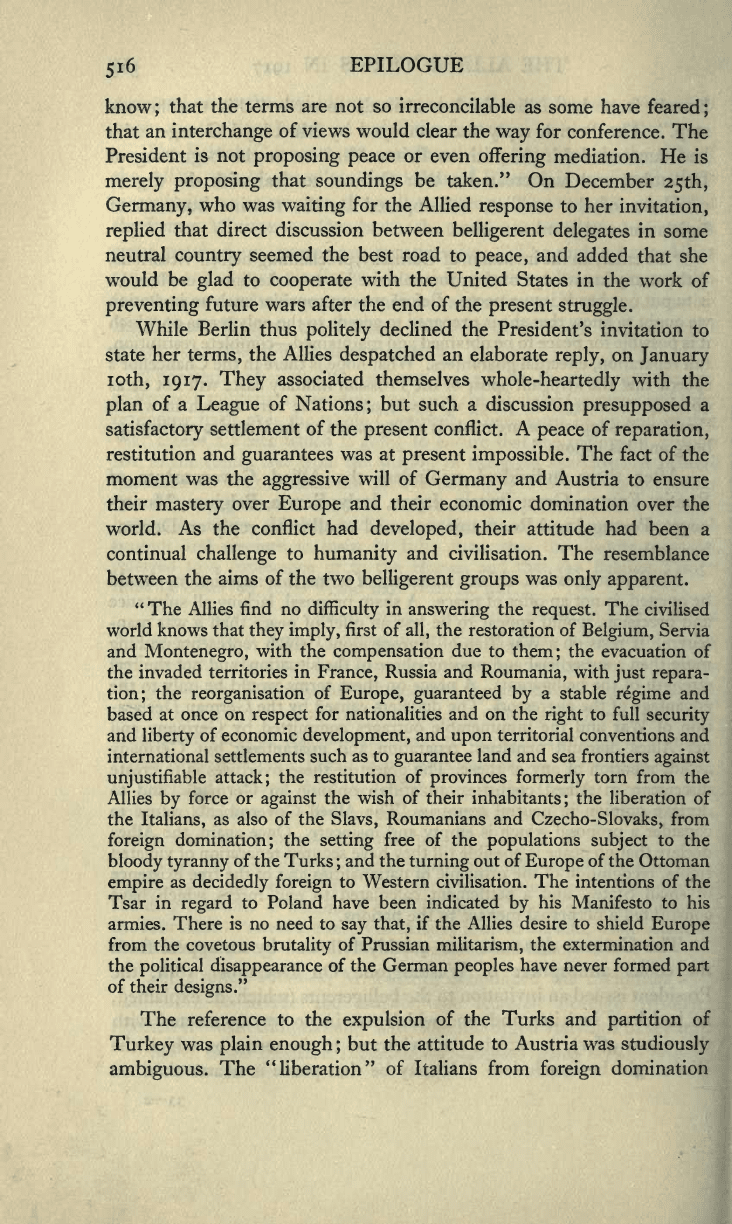
5
i6
EPILOGUE
know
;
that
the terms
are
not
so
irreconcilable
as
some have
feared
;
that
an
interchange
of
views would
clear
the
way
for
conference.
The
President
is
not
proposing
peace
or even
offering
mediation.
He is
merely proposing
that
soundings
be
taken." On
December
25th,
Germany,
who was
waiting
for the Allied
response
to
her
invitation,
replied
that
direct discussion
between
belligerent
delegates
in some
neutral
country
seemed
the
best
road
to
peace,
and
added
that
she
would
be
glad
to
cooperate
with
the
United States in
the work
of
preventing
future
wars after
the
end of
the
present
struggle.
While Berlin
thus
politely
declined
the
President's
invitation to
state
her
terms,
the Allies
despatched
an
elaborate
reply,
on
January
10th,
1917. They
associated themselves
whole-heartedly
with the
plan
of a
League
of
Nations;
but
such a
discussion
presupposed
a
satisfactory
settlement
of
the
present
conflict.
A
peace
of
reparation,
restitution
and
guarantees
was
at
present impossible.
The
fact of the
moment
was
the
aggressive
will
of
Germany
and
Austria
to
ensure
their
mastery
over
Europe
and their
economic
domination
over
the
world.
As
the conflict
had
developed,
their
attitude
had
been a
continual
challenge
to
humanity
and
civilisation. The
resemblance
between
the
aims of the two
belligerent groups
was
only apparent.
"The
Allies find
no
difficulty
in
answering
the
request.
The
civilised
world knows
that
they imply,
first
of
all,
the restoration of
Belgium,
Servia
and
Montenegro,
with the
compensation
due to
them;
the
evacuation of
the
invaded territories
in
France,
Russia
and
Roumania,
with
just
repara-
tion;
the
reorganisation
of
Europe,
guaranteed by
a
stable
regime
and
based
at
once
on
respect
for
nationalities and on the
right
to
full
security
and
liberty
of
economic
development,
and
upon
territorial conventions and
international settlements
such
as to
guarantee
land and
sea
frontiers
against
unjustifiable
attack;
the restitution
of
provinces formerly
torn from
the
Allies
by
force
or
against
the
wish
of
their inhabitants
;
the liberation
of
the
Italians,
as also of the
Slavs,
Roumanians and
Czecho-
Slovaks,
from
foreign
domination;
the
setting
free of the
populations subject
to the
bloody tyranny
of the Turks
;
and the
turning
out of
Europe
of
the Ottoman
empire
as
decidedly
foreign
to Western civilisation.
The
intentions of the
Tsar in
regard
to Poland have been
indicated
by
his Manifesto to
his
armies. There
is
no
need
to
say
that,
if the Allies desire to shield
Europe
from the covetous
brutality
of Prussian
militarism,
the extermination and
the
political
disappearance
of the German
peoples
have never formed
part
of their
designs."
The reference
to the
expulsion
of the Turks and
partition
of
Turkey
was
plain enough
;
but the
attitude
to
Austria
was
studiously
ambiguous.
The
"
liberation
"
of Italians
from
foreign
domination
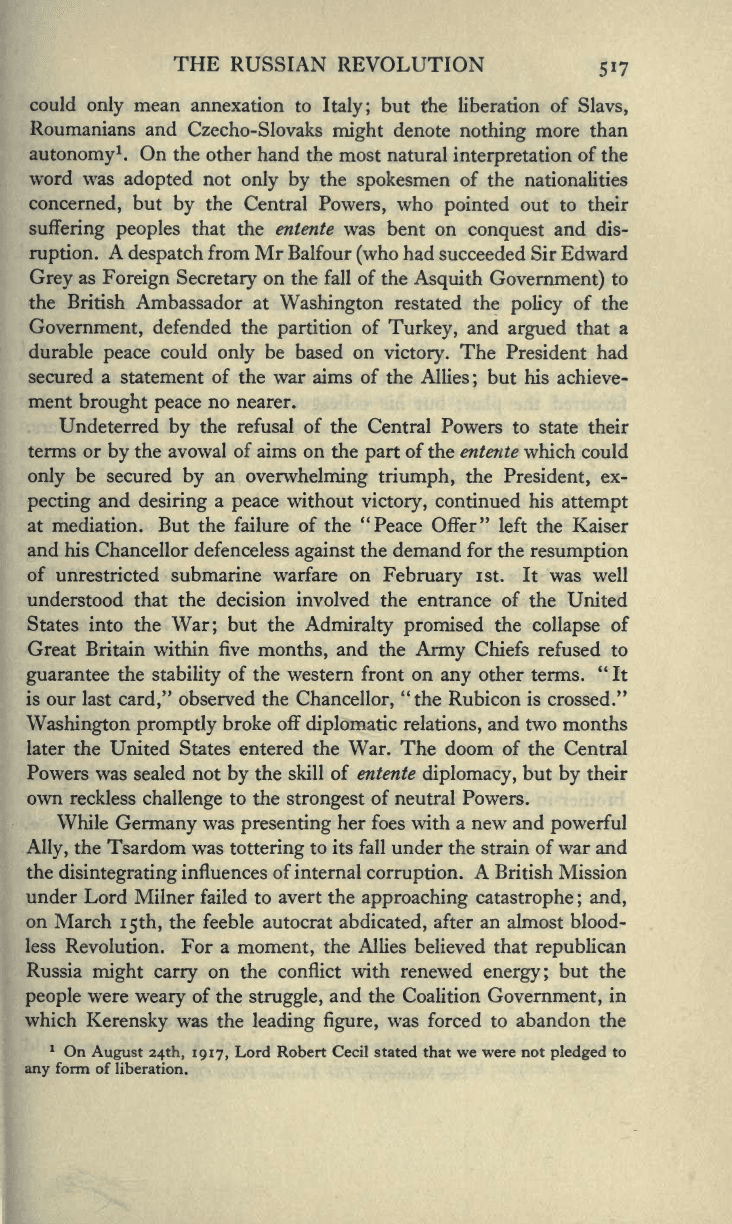
THE
RUSSIAN
REVOLUTION
517
could
only
mean
annexation
to
Italy;
but the liberation of
Slavs,
Roumanians and
Czecho-
Slovaks
might
denote
nothing
more than
autonomy
1
.
On
the
other hand
the
most natural
interpretation
of
the
word was
adopted
not
only by
the
spokesmen
of
the
nationalities
concerned,
but
by
the
Central
Powers,
who
pointed
out to
their
suffering
peoples
that the
entente
was
bent
on
conquest
and dis-
ruption.
A
despatch
from
Mr
Balfour
(who
had
succeeded
Sir Edward
Grey
as
Foreign
Secretary
on
the
fall of
the
Asquith Government)
to
the British
Ambassador
at
Washington
restated the
policy
of
the
Government,
defended
the
partition
of
Turkey,
and
argued
that
a
durable
peace
could
only
be based
on
victory.
The President
had
secured a
statement
of
the
war
aims of
the
Allies;
but his achieve-
ment
brought
peace
no
nearer.
Undeterred
by
the
refusal of
the Central Powers
to state their
terms or
by
the
avowal of aims on
the
part
of
the
entente
which could
only
be
secured
by
an
overwhelming triumph,
the
President,
ex-
pecting
and
desiring
a
peace
without
victory,
continued his
attempt
at mediation. But the
failure of
the
"
Peace
Offer"
left the
Kaiser
and
his Chancellor defenceless
against
the demand
for
the
resumption
of
unrestricted
submarine warfare on
February
1st. It
was well
understood that the
decision
involved the
entrance
of
the United
States
into
the
War;
but the
Admiralty promised
the
collapse
of
Great
Britain
within five
months,
and
the
Army
Chiefs
refused to
guarantee
the
stability
of
the western front
on
any
other
terms.
"
It
is our
last
card,"
observed the
Chancellor,
"the Rubicon is crossed."
Washington
promptly
broke
off
diplomatic
relations,
and
two
months
later
the
United States entered the
War.
The doom of
the
Central
Powers was sealed
not
by
the
skill of
entente
diplomacy,
but
by
their
own
reckless
challenge
to the
strongest
of
neutral
Powers.
While
Germany
was
presenting
her foes
with
a new and
powerful
Ally,
the Tsardom was
tottering
to its
fall
under the strain
of war and
the
disintegrating
influences of internal
corruption.
A
British
Mission
under Lord
Milner
failed
to
avert
the
approaching
catastrophe
;
and,
on
March
15th,
the feeble
autocrat
abdicated,
after
an
almost
blood-
less
Revolution.
For a
moment,
the Allies believed that
republican
Russia
might
carry
on
the conflict
with renewed
energy;
but
the
people
were
weary
of
the
struggle,
and
the Coalition
Government,
in
which
Kerensky
was
the
leading figure,
was forced
to
abandon the
1
On
August
24th,
1917,
Lord Robert Cecil stated
that
we were not
pledged
to
any
form of
liberation.
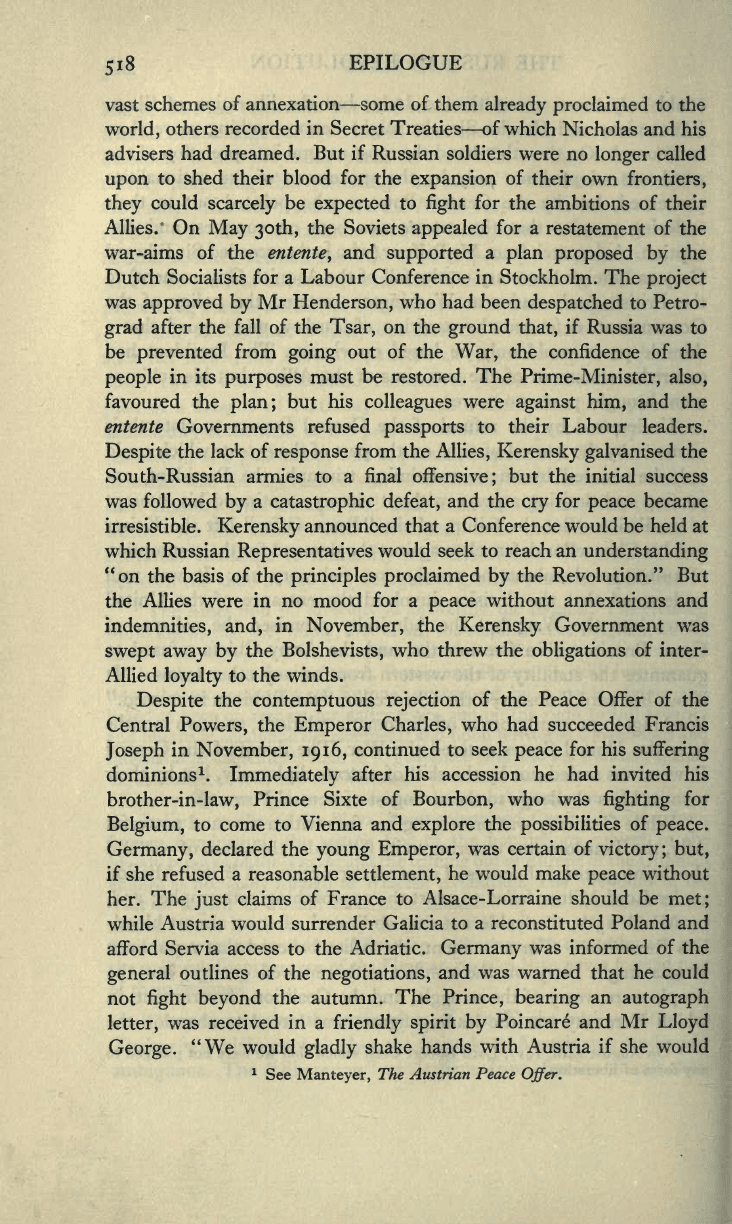
518
EPILOGUE
vast
schemes
of annexation
—
some of them
already proclaimed
to
the
world,
others
recorded
in
Secret Treaties
—
of
which
Nicholas
and his
advisers
had
dreamed. But
if
Russian
soldiers
were no
longer
called
upon
to shed their
blood for
the
expansion
of
their
own
frontiers,
they
could
scarcely
be
expected
to
fight
for
the
ambitions
of
their
Allies.
On
May 30th,
the
Soviets
appealed
for a
restatement
of
the
war-aims of the
entente,
and
supported
a
plan
proposed
by
the
Dutch
Socialists
for a Labour Conference in
Stockholm.
The
project
was
approved by
Mr
Henderson,
who had
been
despatched
to Petro-
grad
after the
fall
of
the
Tsar,
on
the
ground
that,
if Russia was
to
be
prevented
from
going
out
of the
War,
the confidence
of
the
people
in
its
purposes
must
be
restored.
The
Prime-Minister, also,
favoured
the
plan;
but
his
colleagues
were
against
him,
and
the
entente
Governments refused
passports
to their
Labour leaders.
Despite
the
lack of
response
from
the
Allies,
Kerensky galvanised
the
South-Russian armies
to
a final
offensive;
but the initial
success
was followed
by
a
catastrophic
defeat,
and
the
cry
for
peace
became
irresistible.
Kerensky
announced
that
a
Conference would be held at
which Russian
Representatives
would
seek
to
reach
an
understanding
"on
the
basis
of
the
principles
proclaimed by
the Revolution." But
the Allies were
in no mood
for
a
peace
without
annexations and
indemnities, and,
in
November,
the
Kerensky
Government
was
swept away by
the
Bolshevists,
who threw the
obligations
of
inter-
Allied
loyalty
to the
winds.
Despite
the
contemptuous rejection
of
the
Peace
Offer
of
the
Central
Powers,
the
Emperor
Charles,
who had succeeded Francis
Joseph
in
November,
19
16,
continued
to
seek
peace
for his
suffering
dominions
1
.
Immediately
after
his accession he
had
invited
his
brother-in-law,
Prince Sixte
of
Bourbon,
who was
fighting
for
Belgium,
to come to
Vienna and
explore
the
possibilities
of
peace.
Germany,
declared
the
young
Emperor,
was
certain
of
victory;
but,
if she refused
a reasonable
settlement,
he would make
peace
without
her.
The
just
claims of France to
Alsace-Lorraine should be
met;
while Austria
would
surrender
Galicia
to
a
reconstituted
Poland and
afford
Servia access
to
the
Adriatic.
Germany
was informed of
the
general
outlines of
the
negotiations,
and
was
warned
that
he could
not
fight
beyond
the autumn.
The
Prince,
bearing
an
autograph
letter,
was
received
in
a
friendly
spirit by
Poincare and
Mr
Lloyd
George.
"We would
gladly
shake
hands with
Austria
if she would
1
See
Manteyer,
The
Austrian
Peace
Offer.
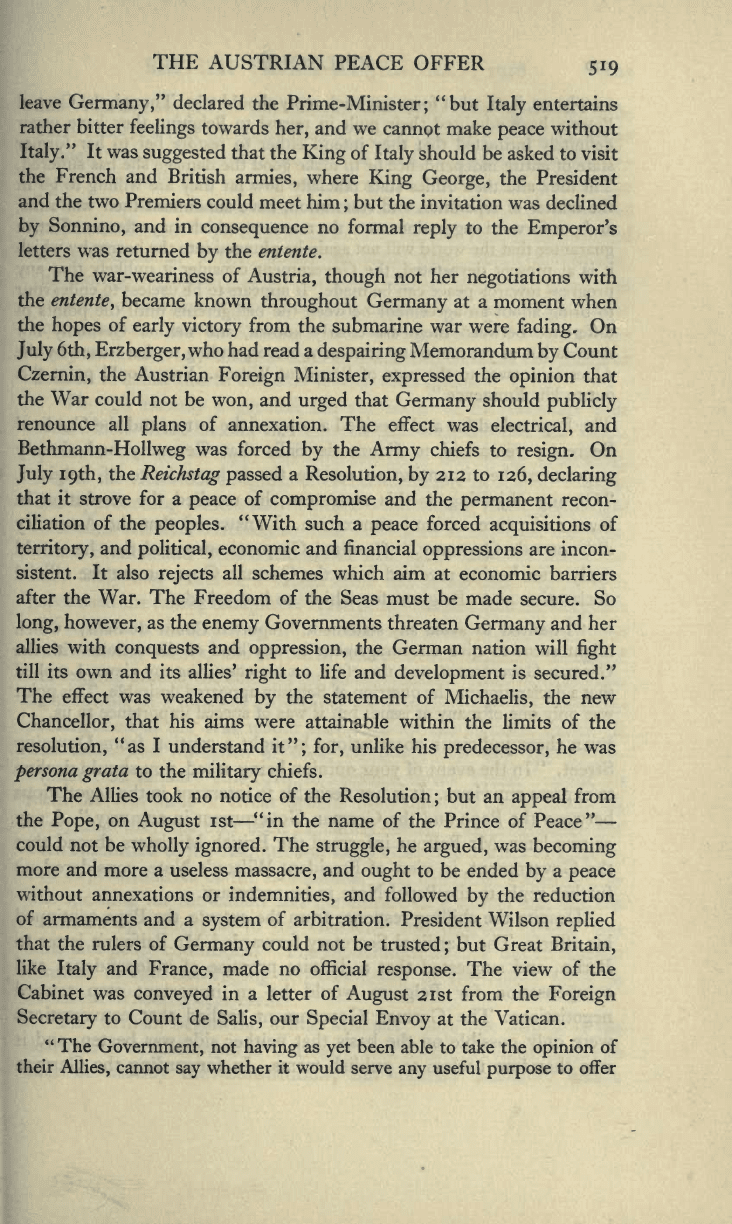
THE
AUSTRIAN
PEACE OFFER
519
leave
Germany,"
declared
the
Prime-Minister;
"but
Italy
entertains
rather bitter
feelings
towards
her,
and
we
cannot
make
peace
without
Italy."
It
was
suggested
that the
King
of
Italy
should be asked
to visit
the French and
British
armies,
where
King
George,
the President
and the
two
Premiers could
meet
him
;
but the
invitation was declined
by
Sonnino,
and
in
consequence
no
formal
reply
to the
Emperor's
letters was
returned
by
the
entente.
The
war-weariness of
Austria,
though
not
her
negotiations
with
the
entente,
became known
throughout
Germany
at
a
moment
when
the
hopes
of
early victory
from
the
submarine
war
were
fading.
On
July
6th,
Erzberger,
who
had
read a
despairing
Memorandum
by
Count
Czernin,
the
Austrian
Foreign
Minister,
expressed
the
opinion
that
the
War
could
not
be
won,
and
urged
that
Germany
should
publicly
renounce all
plans
of
annexation.
The
effect was
electrical,
and
Bethmann-Hollweg
was
forced
by
the
Army
chiefs to
resign.
On
July 19th,
the
Reichstag
passed
a
Resolution,
by
212 to
126,
declaring
that it
strove
for
a
peace
of
compromise
and
the
permanent
recon-
ciliation of
the
peoples.
"With such a
peace
forced
acquisitions
of
territory,
and
political,
economic and financial
oppressions
are incon-
sistent. It also
rejects
all
schemes which aim
at economic
barriers
after the War.
The Freedom of
the Seas
must be
made secure.
So
long,
however,
as
the
enemy
Governments
threaten
Germany
and her
allies
with
conquests
and
oppression,
the
German nation
will
fight
till
its
own
and
its allies'
right
to life and
development
is
secured."
The
effect
was
weakened
by
the
statement
of
Michaelis,
the new
Chancellor,
that
his
aims were
attainable
within the
limits
of
the
resolution,
"as
I
understand
it";
for,
unlike
his
predecessor,
he was
persona
grata
to the
military
chiefs.
The Allies took no
notice of the
Resolution
;
but an
appeal
from
the
Pope,
on
August
1st
—
"in
the
name
of
the Prince of Peace"
—
could
not be
wholly ignored.
The
struggle,
he
argued,
was
becoming
more and
more a
useless
massacre,
and
ought
to be ended
by
a
peace
without
annexations
or
indemnities,
and
followed
by
the reduction
of
armaments
and
a
system
of
arbitration.
President
Wilson
replied
that
the rulers of
Germany
could
not be
trusted
;
but Great
Britain,
like
Italy
and
France,
made
no official
response.
The view
of
the
Cabinet
was
conveyed
in
a letter
of
August
21st
from the
Foreign
Secretary
to
Count
de
Salis,
our
Special
Envoy
at
the Vatican.
"
The
Government,
not
having
as
yet
been
able
to
take
the
opinion
of
their
Allies,
cannot
say
whether
it
would
serve
any
useful
purpose
to
offer
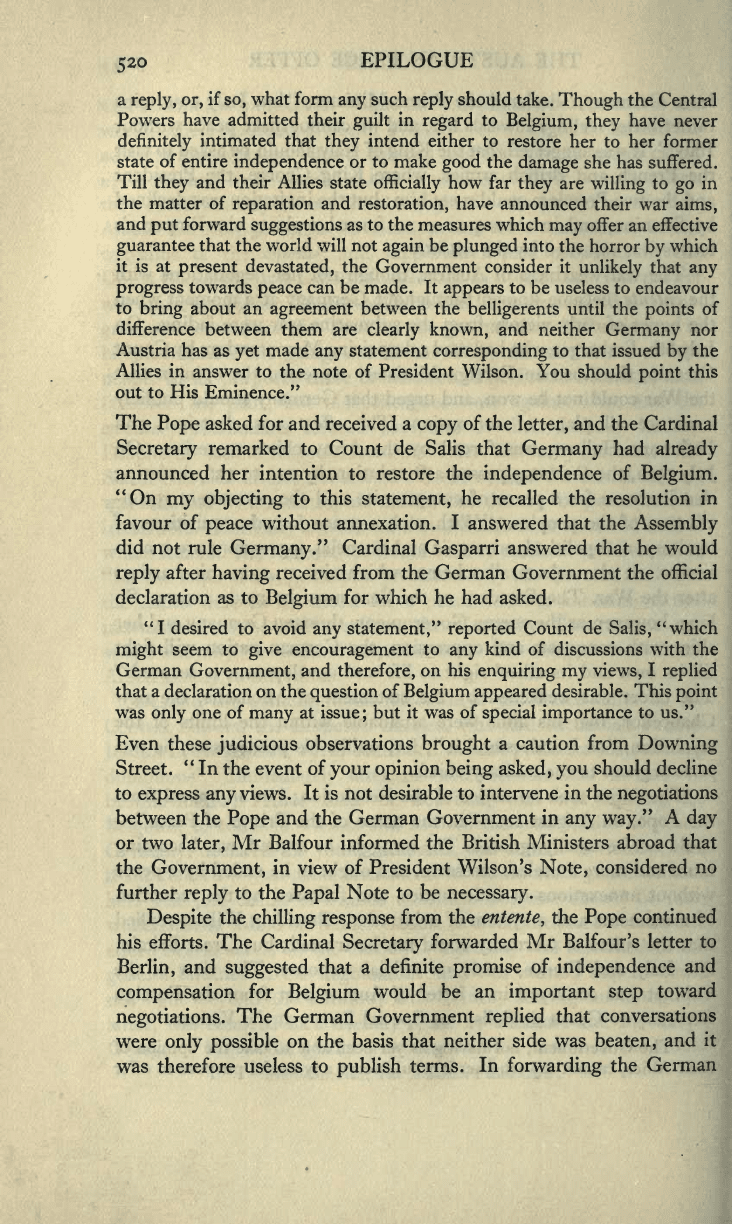
520
EPILOGUE
a
reply,
or,
if
so,
what form
any
such
reply
should
take.
Though
the Central
Powers
have admitted
their
guilt
in
regard
to
Belgium,
they
have never
definitely
intimated that
they
intend
either
to
restore her
to
her former
state
of
entire
independence
or to
make
good
the
damage
she
has suffered.
Till
they
and
their
Allies state
officially
how
far
they
are
willing
to
go
in
the
matter
of
reparation
and
restoration,
have
announced
their war
aims,
and
put
forward
suggestions
as to
the measures which
may
offer an
effective
guarantee
that the
world
will not
again
be
plunged
into
the horror
by
which
it
is at
present
devastated,
the Government
consider it
unlikely
that
any
progress
towards
peace
can be
made.
It
appears
to be useless to
endeavour
to
bring
about
an
agreement
between the
belligerents
until the
points
of
difference
between them are
clearly
known,
and neither
Germany
nor
Austria
has
as
yet
made
any
statement
corresponding
to that issued
by
the
Allies
in
answer to the note of President Wilson. You should
point
this
out
to
His
Eminence."
The
Pope
asked
for
and
received
a
copy
of
the
letter,
and the Cardinal
Secretary
remarked to Count de Salis that
Germany
had
already
announced her
intention
to restore
the
independence
of
Belgium.
"On
my
objecting
to
this
statement,
he recalled the resolution
in
favour of
peace
without annexation.
I
answered
that the
Assembly
did
not rule
Germany."
Cardinal
Gasparri
answered that he
would
reply
after
having
received
from
the German
Government
the
official
declaration
as to
Belgium
for which he had
asked.
"I
desired to avoid
any
statement,"
reported
Count de
Salis,
"which
might
seem to
give encouragement
to
any
kind of
discussions with the
German
Government,
and
therefore,
on
his
enquiring my
views,
I
replied
that
a
declaration
on
the
question
of
Belgium
appeared
desirable.
This
point
was
only
one
of
many
at
issue;
but it was
of
special
importance
to
us."
Even these
judicious
observations
brought
a
caution
from
Downing
Street.
"
In
the event
of
your
opinion
being
asked,
you
should decline
to
express
any
views. It
is
not
desirable to intervene
in
the
negotiations
between
the
Pope
and
the
German
Government
in
any way."
A
day
or two
later,
Mr Balfour informed the
British Ministers
abroad
that
the
Government,
in
view
of
President
Wilson's
Note,
considered
no
further
reply
to
the
Papal
Note to
be
necessary.
Despite
the
chilling
response
from
the
entente,
the
Pope
continued
his
efforts.
The Cardinal
Secretary
forwarded
Mr
Balfour's
letter
to
Berlin,
and
suggested
that
a definite
promise
of
independence
and
compensation
for
Belgium
would
be an
important
step
toward
negotiations.
The
German
Government
replied
that
conversations
were
only
possible
on
the
basis that
neither
side was
beaten,
and
it
was
therefore
useless to
publish
terms.
In
forwarding
the
German
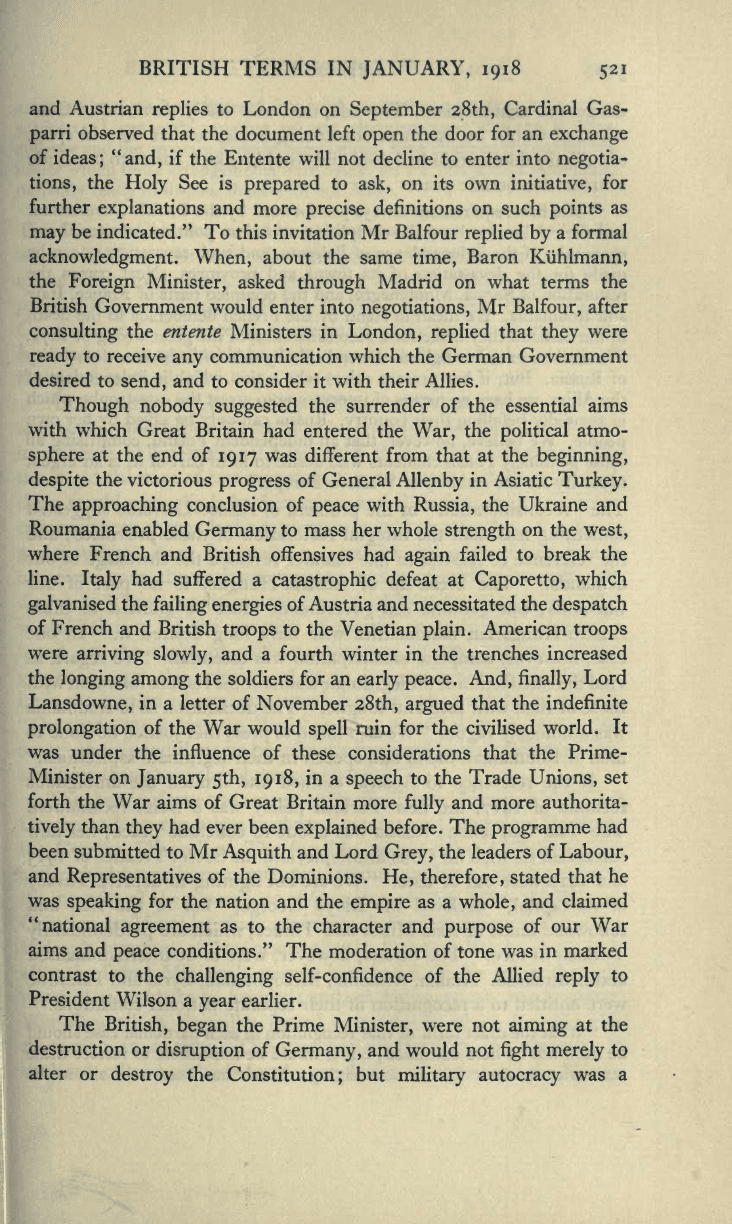
BRITISH
TERMS
IN
JANUARY,
1918
521
and
Austrian
replies
to London on
September
28th,
Cardinal
Gas-
parri
observed
that the
document left
open
the
door for an
exchange
of
ideas;
"and,
if
the
Entente
will
not decline to
enter into
negotia-
tions,
the
Holy
See is
prepared
to
ask,
on
its
own
initiative,
for
further
explanations
and
more
precise
definitions
on such
points
as
may
be
indicated."
To
this
invitation
Mr
Balfour
replied by
a
formal
acknowledgment.
When,
about the
same
time,
Baron
Kuhlmann,
the
Foreign
Minister,
asked
through
Madrid on
what
terms the
British
Government
would
enter into
negotiations,
Mr
Balfour,
after
consulting
the
entente
Ministers
in
London,
replied
that
they
were
ready
to
receive
any
communication
which
the
German Government
desired
to
send,
and
to consider
it
with their Allies.
Though
nobody
suggested
the
surrender of
the
essential
aims
with
which
Great Britain
had
entered the
War,
the
political
atmo-
sphere
at
the end of
19
17
was
different
from
that
at the
beginning,
despite
the
victorious
progress
of General
Allenby
in
Asiatic
Turkey.
The
approaching
conclusion of
peace
with
Russia,
the
Ukraine and
Roumania
enabled
Germany
to
mass
her whole
strength
on
the
west,
where
French and
British offensives had
again
failed to break the
line.
Italy
had
suffered a
catastrophic
defeat at
Caporetto,
which
galvanised
the
failing energies
of
Austria
and necessitated the
despatch
of
French
and
British
troops
to the Venetian
plain.
American
troops
were
arriving
slowly,
and a
fourth
winter
in
the trenches
increased
the
longing
among
the soldiers for
an
early
peace.
And,
finally,
Lord
Lansdowne,
in
a letter of
November
28th,
argued
that
the indefinite
prolongation
of
the War would
spell
ruin
for
the
civilised
world. It
was
under
the influence
of
these
considerations that
the
Prime-
Minister on
January 5th, 19
18,
in a
speech
to
the
Trade
Unions,
set
forth
the War aims of
Great Britain more
fully
and more
authorita-
tively
than
they
had ever been
explained
before. The
programme
had
been
submitted
to Mr
Asquith
and
Lord
Grey,
the leaders
of
Labour,
and
Representatives
of
the Dominions.
He,
therefore,
stated
that
he
was
speaking
for
the nation
and
the
empire
as a
whole,
and
claimed
"national
agreement
as
to the character and
purpose
of our
War
aims
and
peace
conditions." The
moderation of
tone
was
in
marked
contrast to
the
challenging
self-confidence
of
the
Allied
reply
to
President Wilson
a
year
earlier.
The
British,
began
the
Prime
Minister,
were not
aiming
at
the
destruction
or
disruption
of
Germany,
and would
not
fight merely
to
liter
or
destroy
the
Constitution;
but
military
autocracy
was
a
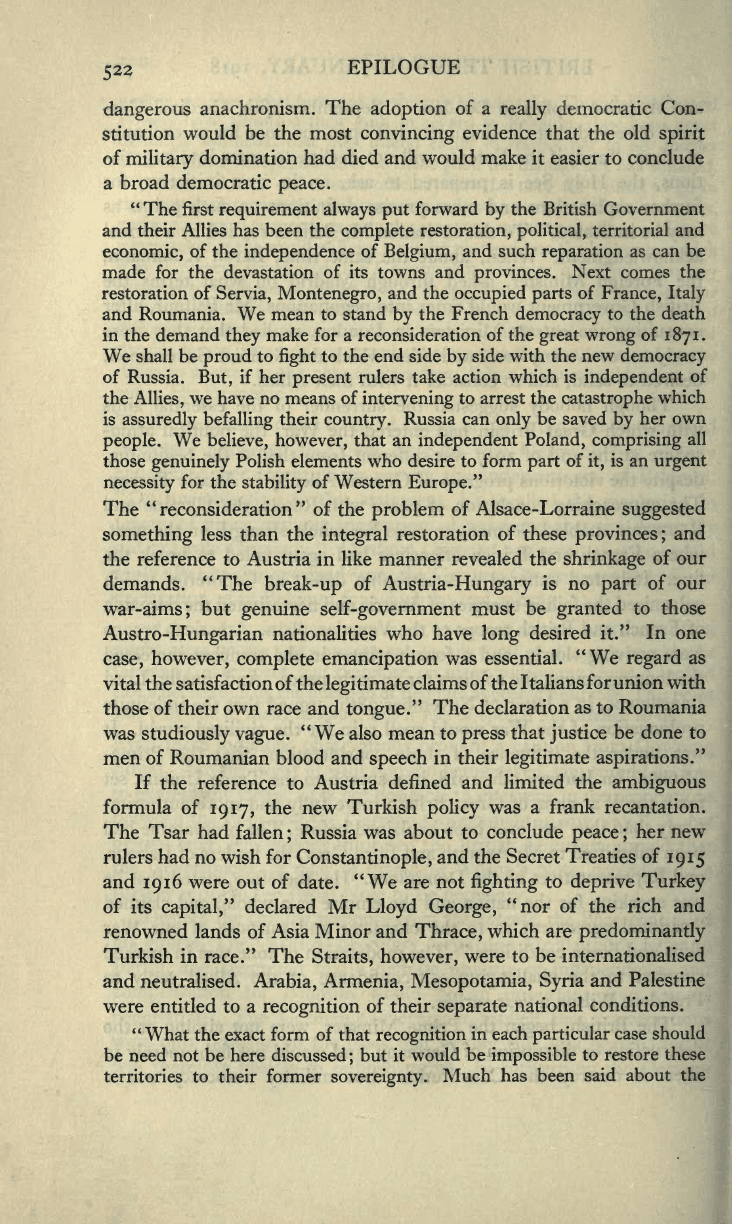
522
EPILOGUE
dangerous
anachronism.
The
adoption
of a
really
democratic
Con-
stitution
would
be
the
most
convincing
evidence
that
the
old
spirit
of
military
domination
had
died
and would make
it easier
to
conclude
a broad
democratic
peace.
"
The
first
requirement always
put
forward
by
the British Government
and their Allies
has been
the
complete
restoration,
political,
territorial
and
economic,
of
the
independence
of
Belgium,
and such
reparation
as
can
be
made for the devastation
of its
towns
and
provinces.
Next
comes
the
restoration of
Servia,
Montenegro,
and the
occupied parts
of
France,
Italy
and
Roumania. We mean
to
stand
by
the French
democracy
to the
death
in
the demand
they
make
for
a reconsideration
of the
great wrong
of
187
1.
We shall be
proud
to
fight
to the end side
by
side
with the new
democracy
of
Russia.
But,
if her
present
rulers take action
which is
independent
of
the
Allies,
we have
no
means
of
intervening
to arrest
the
catastrophe
which
is
assuredly
befalling
their
country.
Russia can
only
be saved
by
her
own
people.
We
believe, however,
that
an
independent
Poland,
comprising
all
those
genuinely
Polish elements
who desire to
form
part
of
it,
is
an
urgent
necessity
for
the
stability
of Western
Europe."
The
"reconsideration"
of
the
problem
of
Alsace-Lorraine
suggested
something
less
than the
integral
restoration
of
these
provinces
;
and
the
reference
to Austria
in
like manner
revealed the
shrinkage
of
our
demands.
"The
break-up
of
Austria-Hungary
is
no
part
of our
war-aims;
but
genuine
self-government
must
be
granted
to
those
Austro-Hungarian
nationalities
who
have
long
desired
it."
In
one
case, however,
complete
emancipation
was essential.
"We
regard
as
vital the satisfaction of the
legitimate
claims of the Italians
forunion with
those
of
their own race and
tongue."
The
declaration
as to Roumania
was
studiously vague.
"We also mean to
press
that
justice
be done to
men of Roumanian blood and
speech
in
their
legitimate
aspirations."
If
the reference
to
Austria
defined
and limited the
ambiguous
formula of
1917,
the
new
Turkish
policy
was
a frank recantation.
The
Tsar
had
fallen
;
Russia was about to
conclude
peace
;
her
new
rulers
had no
wish for
Constantinople,
and the
Secret Treaties
of
1915
and
19
1 6
were
out of
date.
"We
are not
fighting
to
deprive
Turkey
of
its
capital,"
declared
Mr
Lloyd
George,
"nor
of
the
rich and
renowned
lands of Asia Minor
and
Thrace,
which are
predominantly
Turkish
in
race."
The
Straits,
however,
were
to
be internationalised
and neutralised.
Arabia,
Armenia,
Mesopotamia,
Syria
and
Palestine
were entitled to a
recognition
of
their
separate
national
conditions.
"What
the exact
form of
that
recognition
in
each
particular
case
should
be need not be here discussed
;
but
it would
be
impossible
to restore
these
territories to their former
sovereignty.
Much
has been
said
about
the
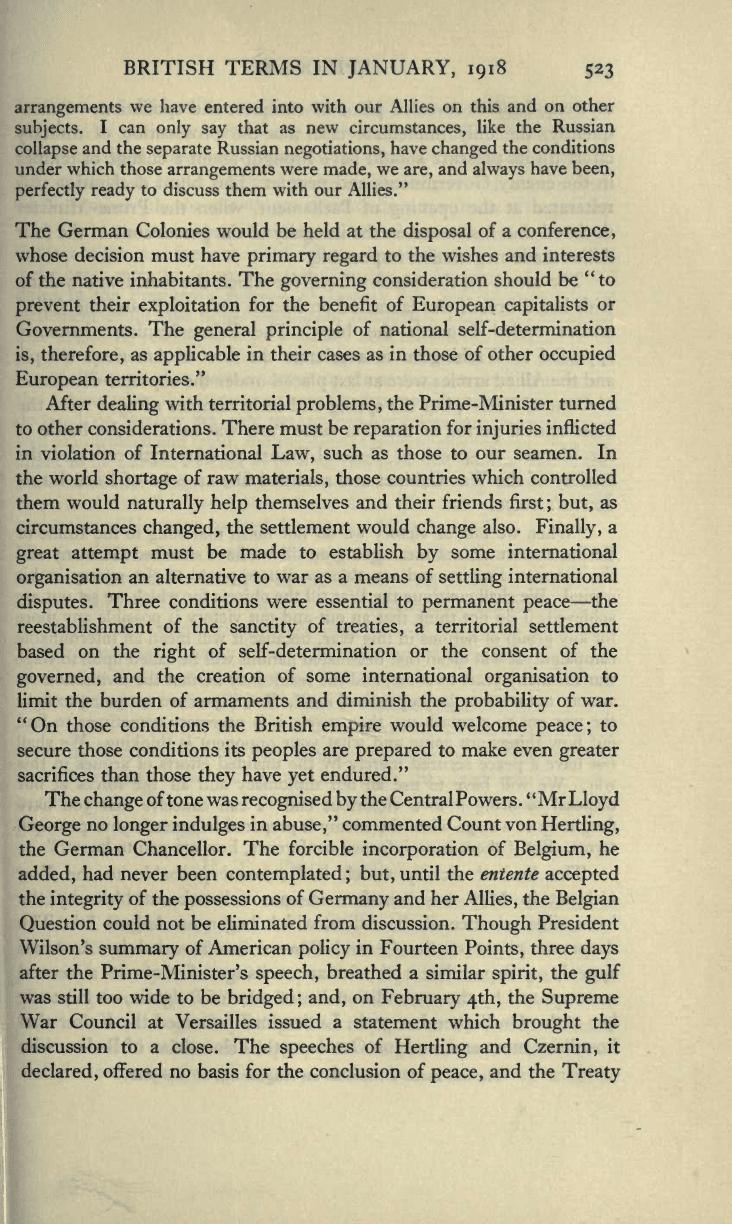
BRITISH TERMS
IN
JANUARY,
1918
523
arrangements
we
have
entered
into with our Allies
on this
and
on
other
subjects.
I
can
only
say
that as new
circumstances,
like
the
Russian
collapse
and the
separate
Russian
negotiations,
have
changed
the conditions
under
which those
arrangements
were
made,
we
are,
and
always
have
been,
perfectly ready
to
discuss them
with our Allies."
The
German
Colonies
would
be held at the
disposal
of a
conference,
whose decision
must have
primary
regard
to the wishes
and interests
of the native
inhabitants.
The
governing
consideration
should
be "to
prevent
their
exploitation
for
the benefit
of
European
capitalists
or
Governments. The
general
principle
of national self-determination
is, therefore,
as
applicable
in
their
cases as
in
those
of
other
occupied
European
territories.
,,
After
dealing
with territorial
problems,
the Prime-Minister turned
to
other considerations.
There must
be
reparation
for
injuries
inflicted
in
violation
of
International
Law,
such as
those to
our seamen.
In
the
world
shortage
of raw
materials,
those countries
which
controlled
them
would
naturally
help
themselves
and
their
friends
first; but,
as
circumstances
changed,
the settlement
would
change
also.
Finally,
a
great
attempt
must
be made to establish
by
some international
organisation
an alternative to
war as
a
means of
settling
international
disputes.
Three
conditions were essential to
permanent peace
—
the
reestablishment
of
the
sanctity
of
treaties,
a
territorial settlement
based on the
right
of self-determination
or
the consent
of
the
governed,
and the creation
of some international
organisation
to
limit the
burden
of armaments and
diminish
the
probability
of
war.
"On
those conditions
the British
empire
would welcome
peace;
to
secure those conditions its
peoples
are
prepared
to make
even
greater
sacrifices than those
they
have
yet
endured."
The
change
of
tone
was
recognised
by
the Central Powers.
"Mr
Lloyd
George
no
longer indulges
in
abuse,"
commented
Count
von
Hertling,
the
German Chancellor. The
forcible
incorporation
of
Belgium,
he
added,
had never been
contemplated;
but,
until the
entente
accepted
the
integrity
of
the
possessions
of
Germany
and
her
Allies,
the
Belgian
Question
could
not
be
eliminated
from
discussion.
Though
President
Wilson's
summary
of
American
policy
in
Fourteen
Points,
three
days
after
the
Prime-Minister's
speech,
breathed a similar
spirit,
the
gulf
was
still too wide
to be
bridged
;
and,
on
February 4th,
the
Supreme
War Council
at
Versailles issued
a
statement
which
brought
the
discussion to a
close. The
speeches
of
Hertling
and
Czernin,
it
declared,
offered no
basis
for the conclusion of
peace,
and
the
Treaty
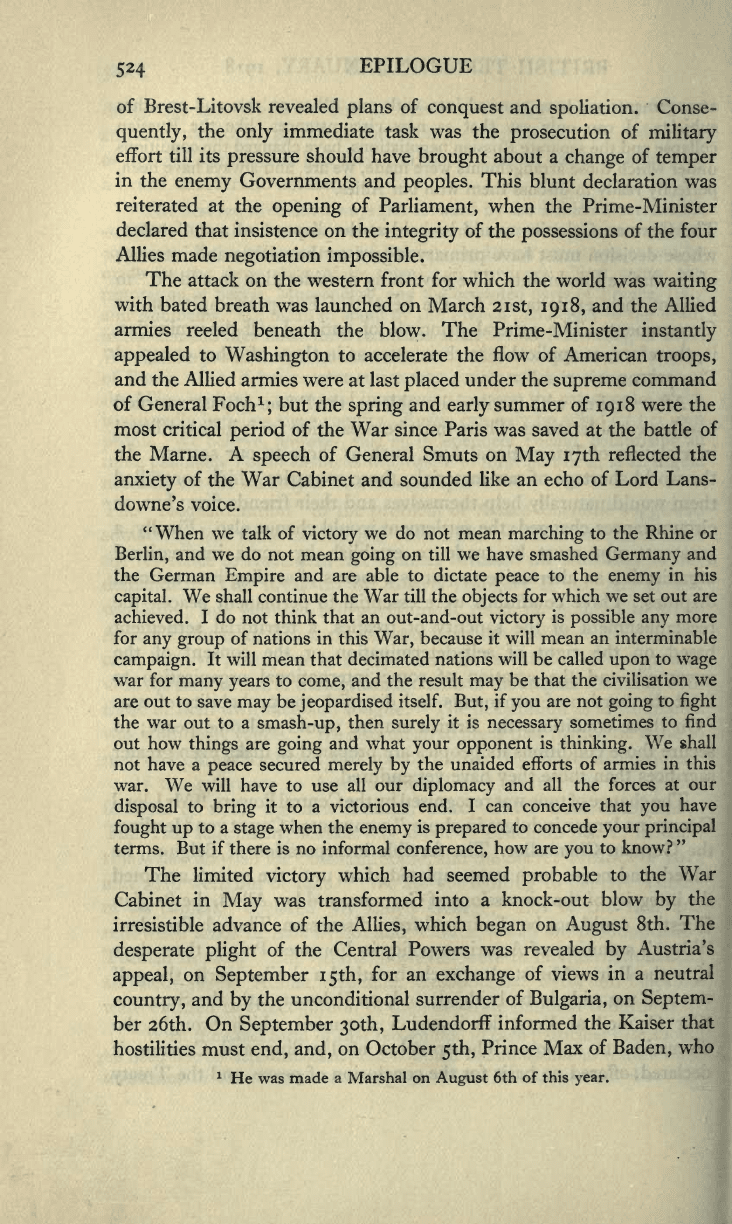
524
EPILOGUE
of Brest-Litovsk revealed
plans
of
conquest
and
spoliation.
Conse-
quently,
the
only
immediate task was the
prosecution
of
military
effort till its
pressure
should
have
brought
about
a
change
of
temper
in
the
enemy
Governments
and
peoples.
This
blunt declaration
was
reiterated
at
the
opening
of
Parliament,
when
the Prime-Minister
declared
that
insistence
on
the
integrity
of
the
possessions
of the
four
Allies
made
negotiation
impossible.
The
attack
on
the western front
for which
the world was
waiting
with bated
breath
was
launched on
March
21st,
191
8,
and
the
Allied
armies
reeled
beneath the
blow. The
Prime-Minister
instantly
appealed
to
Washington
to accelerate the flow
of
American
troops,
and
the
Allied armies were
at last
placed
under the
supreme
command
of General
Foch
1
;
but
the
spring
and
early
summer of
1918
were the
most
critical
period
of
the
War since Paris was saved
at
the battle
of
the
Marne.
A
speech
of
General
Smuts
on
May
17th
reflected the
anxiety
of
the
War
Cabinet
and
sounded
like an echo
of Lord Lans-
downe's
voice.
"When we
talk
of
victory
we do not mean
marching
to the Rhine
or
Berlin,
and
we
do not mean
going
on till we have smashed
Germany
and
the
German
Empire
and are able to
dictate
peace
to the
enemy
in
his
capital.
We
shall
continue the
War till the
objects
for which we set
out are
achieved.
I do not think that
an
out-and-out
victory
is
possible any
more
for
any
group
of nations in this
War,
because
it will mean
an interminable
campaign.
It will
mean
that decimated
nations will be called
upon
to
wage
war for
many years
to
come,
and the result
may
be that the
civilisation
we
are
out to
save
may
be
jeopardised
itself.
But,
if
you
are
not
going
to
fight
the war out to a
smash-up,
then
surely
it is
necessary
sometimes
to
find
out how
things
are
going
and
what
your opponent
is
thinking.
We
shall
not have a
peace
secured
merely by
the unaided efforts
of armies
in this
war.
We will
have
to use all
our
diplomacy
and all the
forces at
our
disposal
to
bring
it to a victorious end.
I
can conceive
that
you
have
fought up
to a
stage
when the
enemy
is
prepared
to concede
your
principal
terms. But
if
there is
no
informal
conference,
how are
you
to
know?
"
The limited
victory
which
had seemed
probable
to
the
War
Cabinet
in
May
was transformed
into
a
knock-out
blow
by
the
irresistible advance of
the
Allies,
which
began
on
August
8th.
The
desperate
plight
of
the Central
Powers was
revealed
by
Austria's
appeal,
on
September 15th,
for an
exchange
of views
in a neutral
country,
and
by
the
unconditional
surrender
of
Bulgaria,
on
Septem-
ber
26th.
On
September 30th,
Ludendorff
informed the
Kaiser that
hostilities must
end,
and,
on
October
5th,
Prince Max
of
Baden,
who
1
He was
made
a
Marshal
on
August
6th
of this
year.
